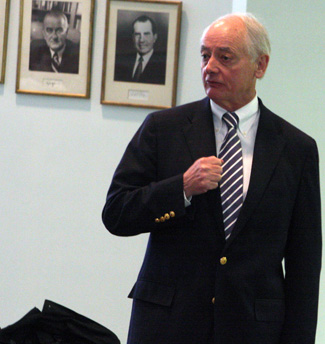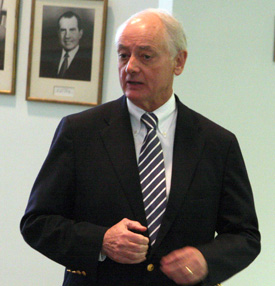The legendary organization responsible for the United States' far reaching intelligence network, the Central Intelligence Agency, has been sensationalized in everything from spy novels to Hollywood blockbusters. Despite the popularity of the CIA, however, little is known of its inner workings. Of those who do know, few individuals possess more knowledge of the CIA's inner workings, and the inner workings of all intelligence gathering bureaus, than Dr. Loch Johnson.
 Johnson, who received his Ph.D at the University of California at Riverside and now teaches at the University of Georgia, was this year's Phi Beta Kappa Visiting Scholar at Wabash. Though here for several events throughout the week, his major lecture took place Wednesday and was titled "The 9/11 Attacks, Iraqi WMD's, and the Decline and Fall of the CIA."
Johnson, who received his Ph.D at the University of California at Riverside and now teaches at the University of Georgia, was this year's Phi Beta Kappa Visiting Scholar at Wabash. Though here for several events throughout the week, his major lecture took place Wednesday and was titled "The 9/11 Attacks, Iraqi WMD's, and the Decline and Fall of the CIA."
Johnson began his lecture by citing how impressed he was with Wabash College. He enjoyed the small-college atmosphere, and was particularly impressed with the overall intellect of both students and professors. "I thoroughly enjoyed visiting many of your classes today," he said. "The level of comments by students and professors was outstanding!"
In diving into the meat of the lecture, Johnson began with a basic assessment of intelligence in the sense of the information gathering undertaken by various nations. He placed special emphasis, though, on the intelligence networks of the United States.
"No civilization in history has built such an elaborate apparatus to gather information about the world as we have," Johnson said. "We spend 50 billion plus dollars, and have created a behemoth of 16 agencies responsible for gathering and understanding information vital to making decisions. We take this task very seriously."
Information the United States would like to know, Johnson stated, can be divided into two categories. These categories are secrets, and mysteries. United States intelligence networks are responsible for understanding the former of the two. "The world is characterized by mysteries and secrets," he said. "Secrets can be found out. can tell you, for instance, the number of Chinese nuclear submarines in operation right now. It's mysteries which cause the problems, mysteries like 'Who will be the next leader of China or Russia?' "
Johnson discussed the logistics of the processes of intelligence, which he divided into phases. The first phase Johnson defined as Planning and Direction. Planning and direction, Johnson explained, is the process by which a blueprint of priorities for intelligence gathering is created.
 The second phase Johnson focused on was "Collection and Int's." This phase is the one so often sensationalized in all forms of media. "Collection and int's is the phase of the physical gathering of data," he said. "Int's are the methods through which we gather this data. For instance, HUM-int is human intelligence, SIG-int is signal intelligence, and IM-int is image intelligence."
The second phase Johnson focused on was "Collection and Int's." This phase is the one so often sensationalized in all forms of media. "Collection and int's is the phase of the physical gathering of data," he said. "Int's are the methods through which we gather this data. For instance, HUM-int is human intelligence, SIG-int is signal intelligence, and IM-int is image intelligence."
The next phase, "Processing," was what Johnson believed to be most difficult. Processing involves the reception of all intelligence data, and is the largest of the logistics headaches. "The different agencies receive literally millions of calls a day, and 450 satellite images," Johnson said. "It's akin to holding a fire hose up to your mouth. What good is having all of the intelligence information if you can't wade through it? On September 10th, 2001, for instance, we intercepted an Al-Qaeda message stating that 'Tomorrow is zero-hour.' We translated it on September 12th. I spoke to someone high up in an agency, and asked what the hardest part of his job was. He said there were three things. Processing, processing, and processing."
The fourth phase in the cycle, said Johnson, is "Analysis." "In analysis, you're trying to make sense of the world through all of the information you've received," he said. "Essentially, you're asking, 'What does it all mean?'"
Though the fifth phase of the cycle, "Dissemination," might on the surface seem easiest, warned Johnson, it can be deceptively difficult. Getting the analyzed information to congressmen who have frenetic lives is challenging. Persuading them to read it is even more so. Following the completion of the phases, the intelligence network is still forced to rely on politicians to think critically about the information, and act responsibly in regards to it. Perhaps in this case a Wabash education would aid office holders.
Johnson reached the culmination of his lecture when he began discussing 9/11. He agreed that it was partially the fault of intelligence networks, but believed there was something more to the issue. "That 9/11 was the greatest intelligence failure in the history of our country does not go far enough," he said. "It was also the greatest policy failure. One can't dismiss the policy aspect of the issue."
Johnson argued that had leading politicians taken preemptive steps on intelligence information obtained regarding terrorist threats over half a decade before 9/11, the tragedy could have been potentially avoided.
In speaking on the issue of WMD's in Iraq, Johnson said that it was his belief that it was mostly the fault of erroneous generalization from past experience. "In Iraq, we suffered from extrapolation," he said. "One thing which we discovered in the first invasion of Iraq was that our estimate of their nuclear capabilities was five years behind. To stay on the safe side, intelligence networks chose in planning the current invasion to overestimate Iraq's nuclear capabilities."
Johnson quickly made it clear in his lecture that he did not believe, as has been popularly claimed, that the false knowledge of WMD's was entirely the fault of Bush or Cheney. "I don't think that Bush or Cheney intentionally spun information to make us think there were WMD's in Iraq," he said. "13 of the 16 intelligence agencies thought that it was a strong possibility that Iraq had WMD's. A few of the most important ones, though, disagreed. The problem occurred when the president was not given information regarding the dissent within the networks."
Johnson took a progressive stance on where the bounds of intelligence networks fall. "I believe there is no possible place for torture or warrantless wiretapping," he said. "There is no reason. Torture does not work. But let me drop a footnote: in the ticking time-bomb scenario, I might advocate that we do whatever it takes. However, there is no room for this in any law. Additionally, if there's one place enemy combatants should not fall into, it's Gitmo. I think that our legal system is robust enough to handle them. If there's one thing our nation has enough of, it's lawyers."
Wabash College freshman Stevan Stankovich was thoroughly impressed with Dr. Johnson's lecture, and particularly with his progressive views. "He was amazing," Stankovich said. "I really enjoyed it, thought he offered a lot of insight into what must occur in order for our nation's leaders to make informed decisions. What I found most intriguing, though, was his view on torture and how not only should it never be used, but it never works anyway."